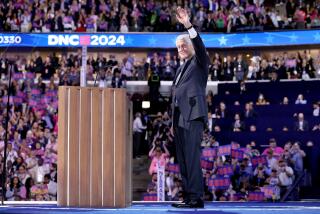Clinton Details Foreign Policy Stand; Faults Bush : Politics: Democratic candidate is first to give comprehensive views, says President ‘coddles’ China, abandons Iraqi Kurds.
- Share via
WASHINGTON — Arkansas Gov. Bill Clinton on Thursday became the first of the Democratic presidential hopefuls to set out a comprehensive foreign policy position, delivering a detailed 45-minute lecture that established clear differences with President Bush but also set him against several of his own party’s prevailing doctrines.
Clinton criticized Bush for ignoring the link between national security and a strong domestic economy, for continuing to “coddle” China after the Tien An Men Square massacre, and for abandoning Iraqi Kurds in their revolt against Saddam Hussein. Bush, he said, “seems to favor political stability and his personal relations with foreign leaders over a coherent policy of promoting freedom, democracy and economic growth.”
But at the same time, Clinton broke with those Democrats who in past campaigns and congressional votes have appeared reflexively opposed to the use of force.
“To protect our interests and our values, sometimes we have to stand and fight,” he said.
The speech at Georgetown University was his third in a series of detailed policy addresses; in his previous talks, Clinton laid out his stands on domestic affairs and the economy. As Thursday’s speech opened, Clinton joked about his resulting image as the “most serious” of the Democrats.
“It’s a bit like Moe being called the smartest of the Three Stooges,” he said.
On policy specifics, Clinton endorsed a plan backed by Senate Armed Services Committee Chairman Sam Nunn (D-Ga.) to divert funds from the Pentagon budget to provide aid to the people of the disintegrating Soviet Union.
A small amount spent stabilizing the former Soviet republics “will reduce by far, far more the money we may have to commit to our defense in the future,” he said.
Clinton also called for a one-third reduction in defense spending by 1997, a deeper cut than Bush has endorsed but less sweeping than many liberal Democrats back.
The cut Clinton advocates would result in about $100 billion less spending on defense than the Administration’s current plans, according to government estimates. To make that spending cut, Clinton said he would end production of the B-2 Stealth bomber, reduce the Navy from 12 carrier task forces to 10 and cut further the number of U.S. troops in Europe.
But on the other side of the ledger, Clinton said he would push plans to build more long-range transport planes for the Air Force and would keep “some U.S. forces in northeast Asia as long as North Korea presents a threat.”
Although he praised Bush’s handling of the Gulf War, Clinton sharply criticized the Administration’s China policy, which many Democratic strategists believe is the President’s most vulnerable foreign policy point. Bush, he said, “has hesitated when democratic forces needed our support.”
Also Thursday, former Massachusetts Sen. Paul E. Tsongas, another Democratic hopeful, proposed a four-point plan to invigorate the anemic economy.
He called for a temporary investment tax credit for businesses that buy new production equipment, accelerated spending of the $151-billion transportation bill, new unemployment insurance rules to cover more of the jobless and for the Federal Reserve to again lower interest rates in hopes of stimulating business.
More to Read
Get the L.A. Times Politics newsletter
Deeply reported insights into legislation, politics and policy from Sacramento, Washington and beyond. In your inbox twice per week.
You may occasionally receive promotional content from the Los Angeles Times.











